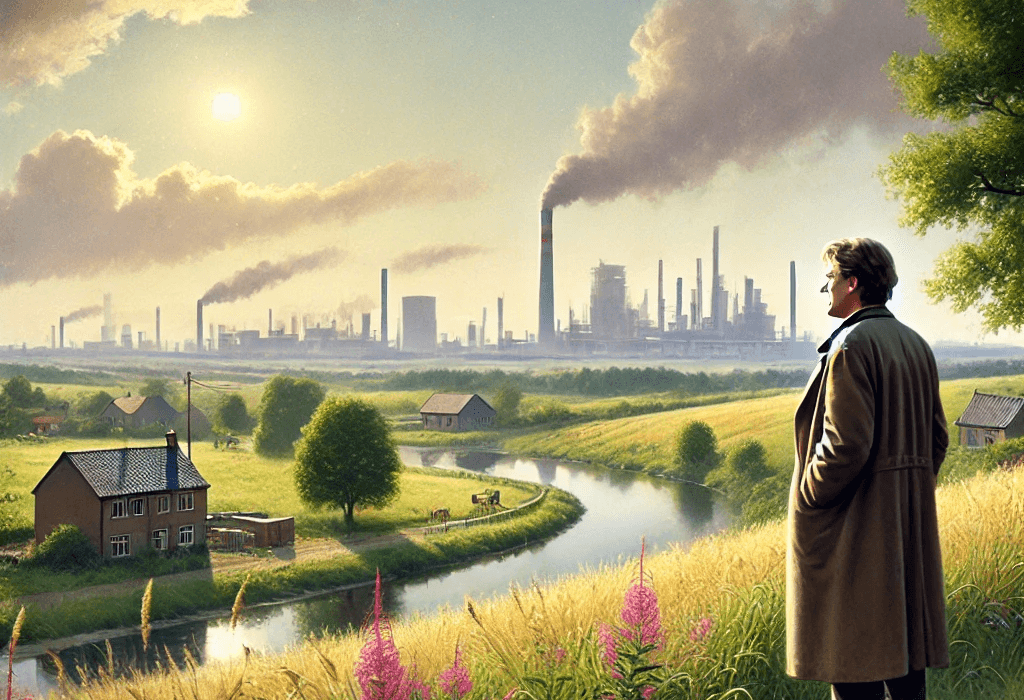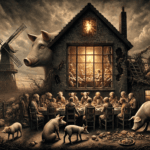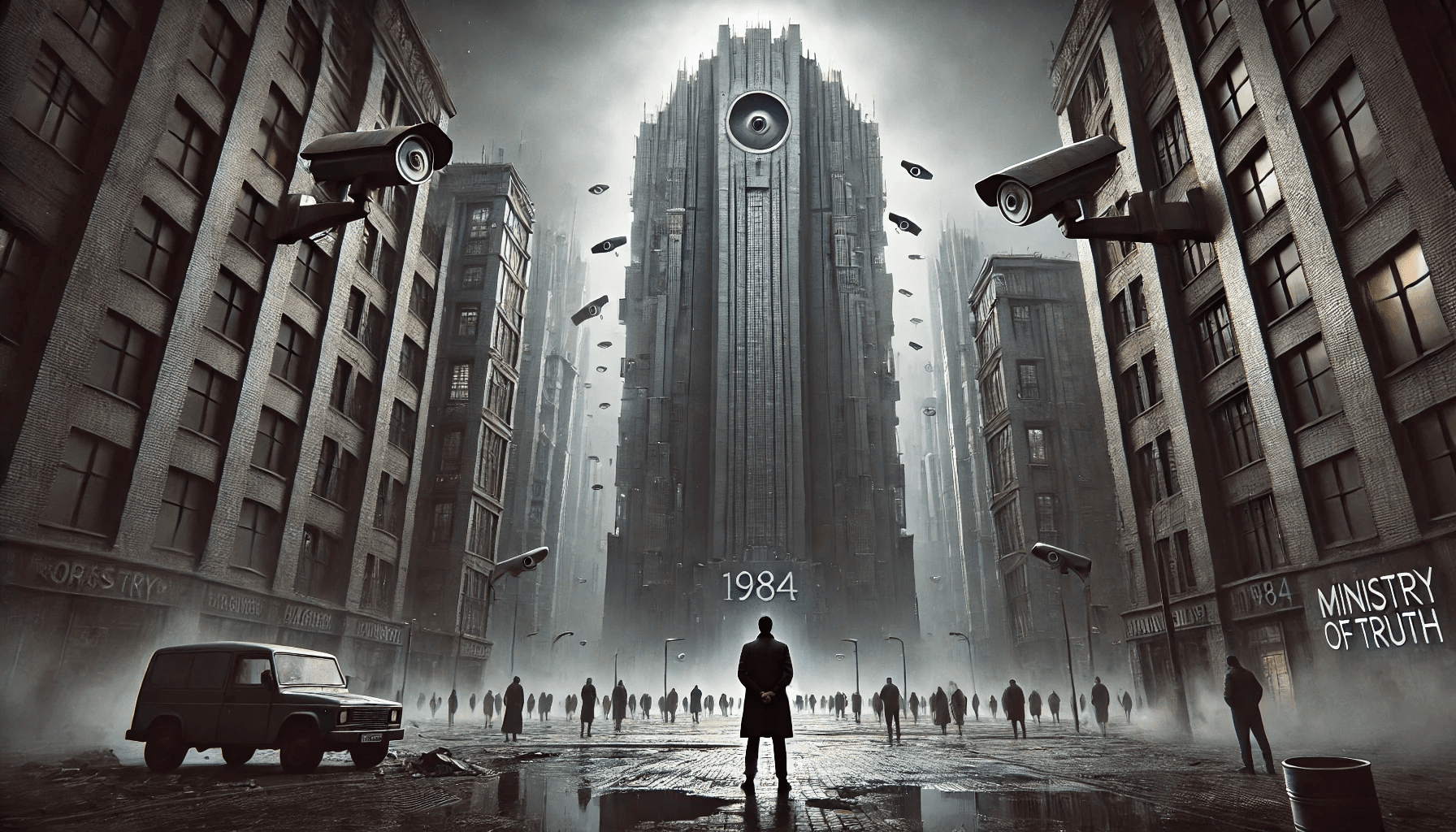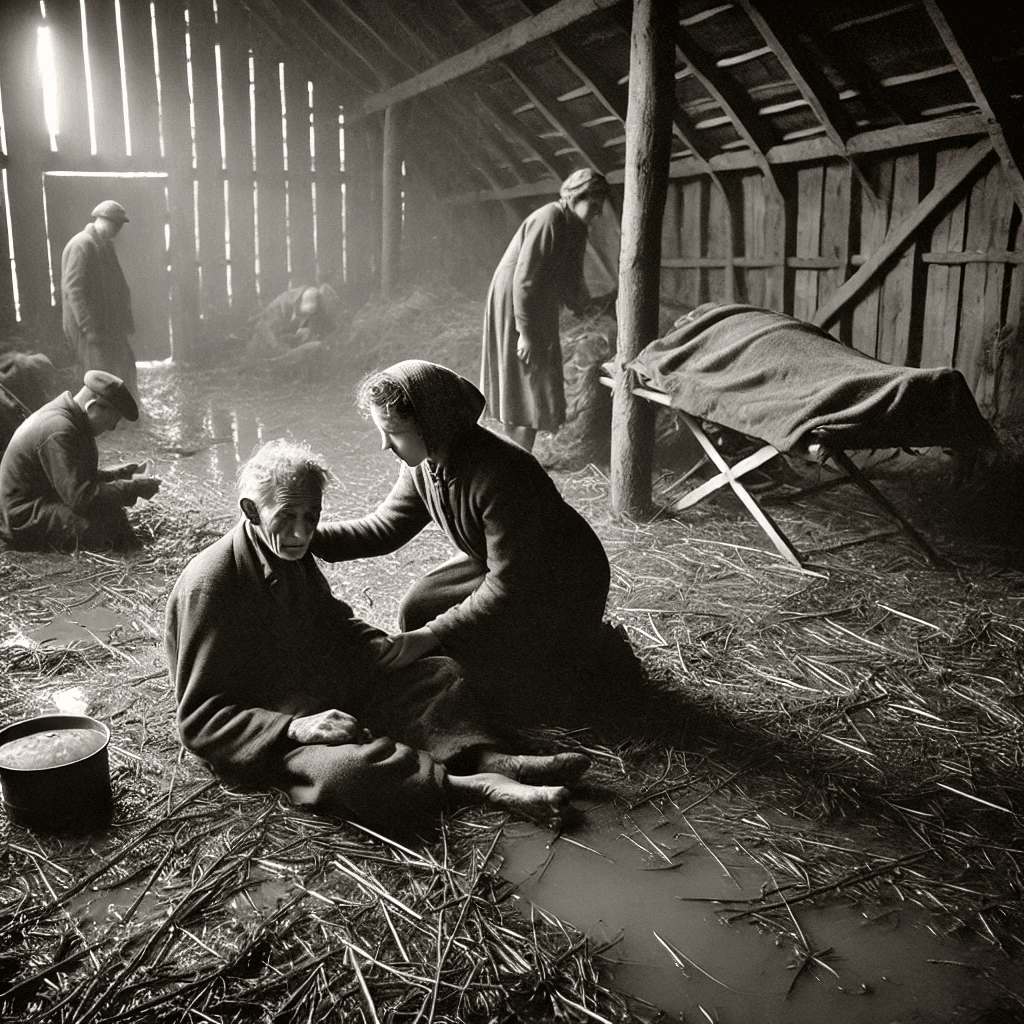Coming Up for Air, written by George Orwell in 1938, is a reflective, satirical novel that explores the anxieties of modern life through the lens of nostalgia and existential dread. Set in pre-World War II England, it captures the protagonist’s yearning for the simplicity of his childhood amidst the encroaching chaos of contemporary society. Orwell delivers a vivid portrait of a man caught between the comfort of the past and the unsettling realities of the present.
Plot Summary
On a drab January morning, George Bowling, a middle-aged insurance salesman living in suburban England, begins his day reflecting on his life. He is acutely aware of his physical decline—his burgeoning belly and his recently acquired false teeth—and feels a gnawing dissatisfaction with his existence. Life on Ellesmere Road, where every house looks alike, has become suffocating, marked by his strained marriage to Hilda, his two noisy children, and the relentless grind of his mundane job. George sees himself as just another cog in the dreary machinery of suburban life, dreaming of escape while dreading the inevitable march of time.
As George goes about his day, he recalls a secret stash of money he recently won on a horse race, seventeen pounds hidden away from his wife. This modest windfall becomes a catalyst for his fantasies. He toys with frivolous ideas of spending it on indulgences like cigars, whiskey, or even a weekend with a woman. Yet, beneath these fleeting thoughts lies a deeper yearning—to reconnect with the world of his youth, a simpler time when life felt vibrant and meaningful. Memories of Lower Binfield, the idyllic market town where he grew up, begin to flood his mind, pulling him further into the past.
George reminisces about his childhood with vivid clarity. Lower Binfield was a place of lush meadows, bustling market days, and unhurried lives. He recalls his father, a seed merchant, and the rhythms of rural life that revolved around the seasons and local traditions. He remembers long, sunlit days exploring the countryside, the taste of wild berries, and the camaraderie of his older brother, Joe. These moments evoke a bittersweet longing for an England that, to George, no longer exists—a world unsullied by industrial sprawl and urban monotony.
As the days pass, George becomes increasingly obsessed with the idea of visiting Lower Binfield. He envisions it as an unspoiled sanctuary, untouched by the chaos of modernity. The looming specter of war—planes overhead, headlines filled with dread—only deepens his desire to retreat to this imagined haven. With his secret money in hand, he resolves to take a solitary trip back to his hometown, hoping to rediscover the joy and peace that his life now lacks.
When George finally arrives in Lower Binfield, reality collides with his dreams. The town is not the pastoral paradise of his memories but a place transformed by time and progress. The fields where he once played have been paved over for housing developments. The serene river where he fished as a boy is polluted and neglected. Even the old family shop is gone, replaced by a soulless storefront. Walking through the town, George feels a profound sense of loss, as if the essence of his childhood has been erased.
Determined to find some remnant of his past, George visits Binfield House, a grand estate he admired as a child. To his dismay, the house is in ruins, a shell of its former grandeur. He realizes that the past he yearns for is irretrievably lost, a victim of the relentless march of modernity. This stark revelation forces George to confront the futility of his nostalgia. The world he longs for exists only in his memory, and the present offers no sanctuary from the encroaching tide of industrialization and war.
Defeated, George returns home to Ellesmere Road. His brief escape has only amplified his discontent. The suburban life he despises now feels even more constraining, and the looming threat of war casts a shadow over his future. As George steps back into his routine, he is struck by the inevitability of it all—how life, like the world around him, marches on, indifferent to individual desires and dreams.
The day ends as it began, with George pondering his place in a world that feels increasingly alien. He recognizes the absurdity of his fantasies and the impossibility of recapturing the innocence of youth. Yet, in the quiet moments before sleep, he feels a faint glimmer of acceptance. While he cannot reclaim the past, he can at least acknowledge its beauty and mourn its passing.
Main Characters
George Bowling: A middle-aged insurance salesman and the novel’s narrator, George is both cynical and sentimental. At 45, he grapples with dissatisfaction in his suburban life, marked by his strained marriage, financial troubles, and unremarkable existence. George’s introspective journey and sharp observations reveal his longing for the idyllic rural world of his childhood, offering poignant critiques of industrialization and societal discontent.
Hilda Bowling: George’s wife, Hilda, is portrayed as practical but nagging, emblematic of the mundane domesticity that George finds stifling. Her constant preoccupation with the family’s financial struggles contrasts with George’s escapist fantasies, underscoring their emotional distance.
Billy and Lorna Bowling: George’s children, Billy and Lorna, represent another facet of his suburban dissatisfaction. Their noise, quarrels, and demands highlight the chaos and monotony of family life, pushing George to seek solace in his memories.
George’s Father: A corn merchant from George’s childhood, his father epitomizes the sturdy, uncomplicated life George idealizes. The family business and the town of Lower Binfield symbolize a vanished England George yearns to reclaim.
Theme
Nostalgia and the Loss of Innocence: George’s romanticized memories of Lower Binfield reflect a yearning for the simplicity and perceived moral clarity of the past. The stark contrast between his childhood and the industrialized present underscores the erosion of traditional values and natural beauty in modern society.
The Impending Threat of War: The novel’s backdrop of looming global conflict creates an atmosphere of unease. George’s reflections on the past are colored by his fear of the future, as Orwell uses the threat of war to critique the fragility of societal progress and the inevitability of human suffering.
Alienation in Modern Life: Through George’s dissatisfaction with suburban existence, Orwell critiques the dehumanizing effects of industrialization and consumer culture. The repetition and artificiality of George’s daily life emphasize a profound alienation from both nature and authentic human connection.
Escapism: George’s dreams of returning to his childhood home symbolize his desire to escape the constraints of adulthood and the complexities of modernity. However, these fantasies are ultimately revealed to be impractical, highlighting the futility of clinging to the past.
Writing Style and Tone
George Orwell employs a conversational, candid tone in Coming Up for Air, allowing George Bowling’s personality to shine through in the narrative. The prose is straightforward yet richly descriptive, bringing to life the bucolic nostalgia of George’s childhood and the grim realities of his present. Orwell’s use of humor, often tinged with bitterness, reinforces the protagonist’s disillusionment while providing sharp social commentary.
Orwell balances realism with introspection, crafting scenes that oscillate between vivid portrayals of suburban banality and lyrical depictions of rural England. The narrative’s pacing mirrors George’s state of mind—slow and reflective during moments of reminiscence, brisk and fragmented when dealing with the chaos of everyday life. This dynamic style immerses readers in George’s internal conflict, capturing both his yearning for the past and his dread for the future.
We hope this summary has sparked your interest and would appreciate you following Celsius 233 on social media:
There’s a treasure trove of other fascinating book summaries waiting for you. Check out our collection of stories that inspire, thrill, and provoke thought, just like this one by checking out the Book Shelf or the Library
Remember, while our summaries capture the essence, they can never replace the full experience of reading the book. If this summary intrigued you, consider diving into the complete story – buy the book and immerse yourself in the author’s original work.
If you want to request a book summary, click here.
When Saurabh is not working/watching football/reading books/traveling, you can reach him via Twitter/X, LinkedIn, or Threads
Restart reading!








